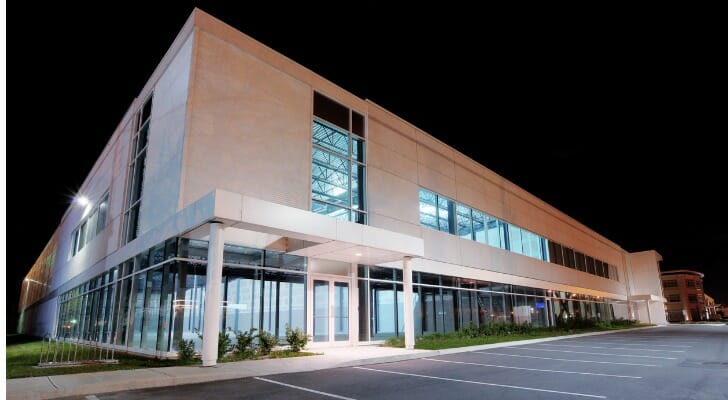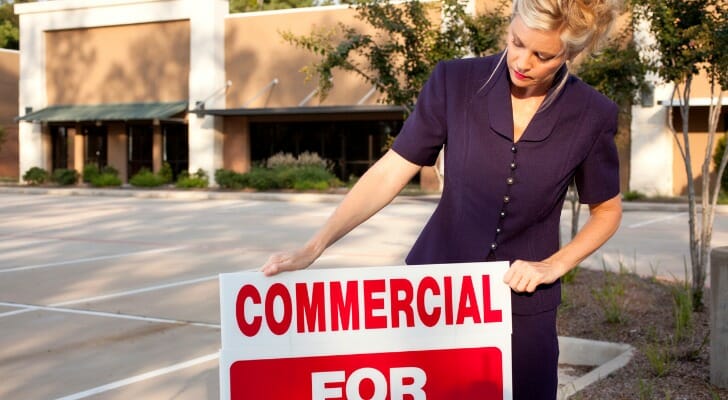 Buying commercial real estate can diversify an investment portfolio and provide potentially greater returns than residential properties. Commercial buildings, including office, retail, warehouse and industrial factories, commonly carry higher prices and require more ongoing costs to manage than residential properties. However, commercial landlords are usually dealing with businesses, which avoids most of the late-night and weekend annoyances of dealing with residential tenants. You can work with a financial advisor who can help you decide if commercial properties make sense for your portfolio.
Buying commercial real estate can diversify an investment portfolio and provide potentially greater returns than residential properties. Commercial buildings, including office, retail, warehouse and industrial factories, commonly carry higher prices and require more ongoing costs to manage than residential properties. However, commercial landlords are usually dealing with businesses, which avoids most of the late-night and weekend annoyances of dealing with residential tenants. You can work with a financial advisor who can help you decide if commercial properties make sense for your portfolio.
How to Buy Commercial Real Estate in 7 Steps
Buying commercial real estate is very different from buying a home, even if you plan on that home is going to be an investment property. There are things to consider before you move forward towards making an offer on a commercial property that you don’t have to worry about with a residential one, such as who potential tenants are and how likely they are to fulfill the entire lease. Plus, the maintenance on commercial real estate is much more expensive.
Here are the seven steps you should take to buy the commercial property you’re wanting in your portfolio:
1. Select a Strategy
Commercial real buyers can pursue several different strategies based on the objectives they are after. For instance, if stable income is the goal, retail tenants are more likely to sign long-term leases than office tenants. Another strategy might be to provide a business with quarters to house its own operations. Some types of commercial real estate may offer superior tax deduction opportunities than others. Before choosing to invest in real estate it’s important to choose one or more benefits as the primary goals of the investment, then make sure that later decisions fit this strategy.
2. Pick a Property Type
There are many ways to invest in real estate. There also are different types of commercial real estate, including suburban malls, high-rise offices, apartment buildings, distribution centers and factories. Office buildings are the most common type, followed by retail. Each property type has different characteristics and advantages. For instance, retail stores may invest significant amounts in decorating and customizing spaces. As a result, they may be willing to sign extended leases covering up to 10 or 15 years. This can reduce the owner’s risk of incurring a costly vacancy.
3. Arrange Financing
As with shopping for a home, it’s best to line up financing before looking at what’s available. Commercial real estate financing is unlike residential real estate financing, however. For instance, lenders considering a single-family home mortgage will look only at the creditworthiness, income and existing indebtedness of the owner-occupant. Commercial lenders look instead at whether the income generated by the property will be sufficient to pay back the loan.
Commercial property buyers also must provide larger down payments, typically 20% to 30% of the purchase price. Familiar names like the Federal Housing Administration can participate in financing multifamily residential properties. Financing for other types of commercial real estate can come from banks, hard-money lenders and sellers.
4. Assemble the Team
 Buying commercial real estate usually involves sizable amounts of capital, and the scale of the investment means most commercial real estate buyers work with a team of experts to help them identify properties, analyze opportunities, negotiate terms and structure the deal. A commercial real estate agent or broker is almost always part of such a team. It may also include a financial advisor, accountant, attorney specializing in commercial real estate, lender or mortgage broker and tax attorney.
Buying commercial real estate usually involves sizable amounts of capital, and the scale of the investment means most commercial real estate buyers work with a team of experts to help them identify properties, analyze opportunities, negotiate terms and structure the deal. A commercial real estate agent or broker is almost always part of such a team. It may also include a financial advisor, accountant, attorney specializing in commercial real estate, lender or mortgage broker and tax attorney.
5. Identify Properties
An experienced commercial real estate broker with local market knowledge can provide invaluable assistance in identifying appropriate properties. Specialized commercial real estate directories, such as Loopnet.com, are often used for initial screening. As with any sort of real estate, location is the prime concern. The appropriate zoning, good access to transit and appealing prospects for price appreciation due to market trends are location traits often sought by commercial property investors.
6. Do Due Diligence
Analyzing the financial aspects of a buying opportunity is critical for successful commercial real estate buyers. Shoppers prepare pro forma projections of rental income, vacancy rates, costs to maintain and repair, taxes and more for each property under consideration. Buyers often look at many properties before finding one with a pro forma that fits their investment requirements.
Unlike appraised prices for residential property pricing, which are based on recent sale prices for comparable properties, commercial property pricing is based on a multiple of the expected net operating income the property is expected to generate. The multiple varies by market and property type.
7. Negotiate the Deal
Negotiating commercial real estate acquisitions can be straightforward compared to working out a deal to buy a single-family residence from an owner-occupant. That’s because commercial property owners don’t have emotional connections to their properties.
However, that doesn’t mean commercial property negotiations are easy. Appraisals, inspections and legal reviews of offers and contracts are essential for these demanding transactions. Most commercial buyers are careful to include a contingency clause that lets them back out of the deal if something comes up such as a problem with inspection or zoning.
Things to Consider When Buying Commercial Real Estate
Before you make commercial real estate part of your portfolio you should have a good idea of what you’re getting yourself into. Everything can be quite different than buying residential investment properties, from funding the deal to determining a long-term lease. Here are things you should consider if you’re not sure whether it should be part of your portfolio:
- Types of Properties: Multi-family housing might be a good commercial property type if you’re used to residential properties, but all other types are going to be very different. The other main types include retail, office and industrial. Each brings separate challenges and things you must understand to be successful.
- Target Tenants: Each type of property brings a different type of tenant that you’ll need to understand in order to properly fill your property.
- Leases: Commercial properties tend to have more long-term leases and different articles with those leases than a residential property would.
- Understanding the Math: Many properties will have a lot of considerations that could impact your bottom line. For example, an office building in your area might require you to pay for cleaning and security which you would need to factor into the rental costs. Calculating wrong can cost you a lot of money on the property.
- Financing: Financing works very differently depending on whether you’re buying a multifamily development or an office building. You will likely need a business plan to get banks to invest in your project.
The Bottom Line
 Buying commercial property can give investors higher returns, less risk and more long-term stability than residential real estate investments, and also allow them to work regular business hours rather than tending to residents’ around-the-clock demands. It has significant differences when it comes to financing and negotiating deals, however, and the dollar amounts tend to be larger than with single-family home investments. Most commercial real estate buyers work with a team of experts to reduce the chances of a costly mistake.
Buying commercial property can give investors higher returns, less risk and more long-term stability than residential real estate investments, and also allow them to work regular business hours rather than tending to residents’ around-the-clock demands. It has significant differences when it comes to financing and negotiating deals, however, and the dollar amounts tend to be larger than with single-family home investments. Most commercial real estate buyers work with a team of experts to reduce the chances of a costly mistake.
Tips on Buying Commercial Real Estate
- An experienced financial advisor is a vital part of the team any savvy investor uses to select, structure and manage commercial real estate acquisitions. SmartAsset’s free tool matches you with up to three financial advisors who serve your area, and you can interview your advisor matches at no cost to decide which one is right for you. If you’re ready to find an advisor who can help you achieve your financial goals, get started now.
- Part of doing your due diligence for a commercial real estate investment is calculating the mortgage. A free easy-to-use mortgage calculator can quickly give you an idea of the dollar amounts involved.
Photo credit: ©iStock.com/buzbuzzer, ©iStock.com/fstop123, ©iStock.com/Natee Meepian